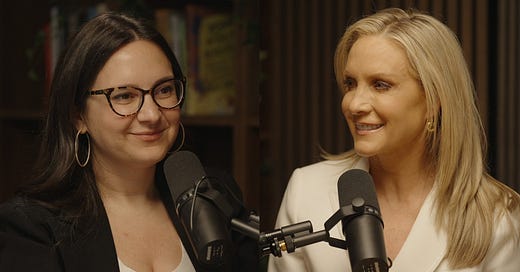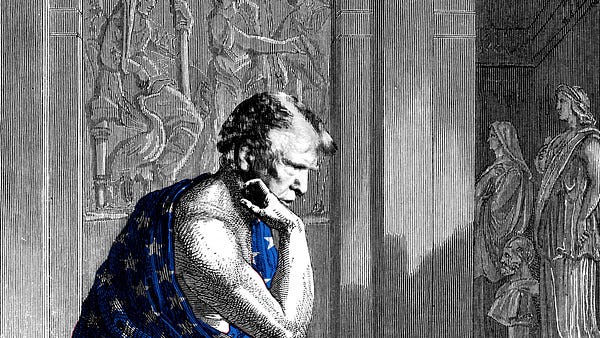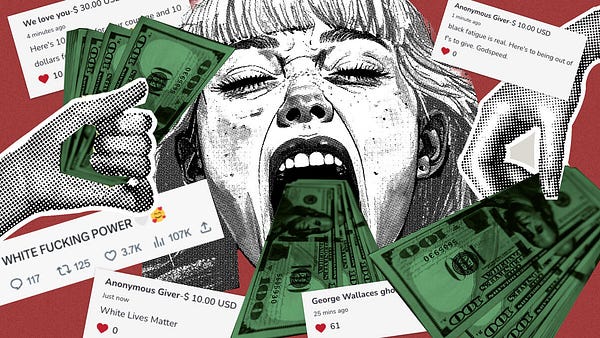
I consider Martin Gurri’s book, The Revolt of the Public, among the most important of this century. (If you have never heard of the author or his book: I’m jealous. A good place to start is by listening to him on Honestly.)
The SparkNotes version is that the former CIA analyst managed to predict Trump, Brexit, WallStreetBets, Black Lives Matter, the yellow vests protests in France, and more back in 2014. That’s because he saw, ahead of so many, that the central conflict of our era is not between red and blue, but between the elites and the masses, between the tower and the square, between the gatekeepers and the gate-crashers.
He makes the compelling case that conflict has a single source: the internet. So if you think we’re going back to normal anytime soon, Gurri argues: dream on. The revolution is just getting underway.
I could go on, but really, you should treat yourself to reading it.
So suffice it to say I am thrilled to publish him for the first time today on the following conundrum: We are more affluent than any society in the history of the world. So why do so many feel so very empty? —BW
In Moscow on the Hudson, an undeservedly obscure 1984 film, Robin Williams plays a Russian musician who defects from the Soviet Union in New York City. In his first attempt at mastering American life, the new immigrant enters a supermarket and asks to be directed to the coffee line. A clerk shows him the aisle and shrugs, “No line.” A wonderful scene follows. Williams wanders down the aisle dazed by coffee products stacked on top of each other in an imposing variety of brands gleaming at him from the counter.
“Coffee,” he mutters. “Coffee, coffee, coffee!” In the end, he crumples to the floor, unable to deal with so much abundance.
I’ve been told of a real-life version of this scene. A woman who had recently escaped from Cuba burst into tears in a Miami supermarket—surrounded by such a profusion of goods, her heart broke, she said, when she thought about the people in Cuba who had so little.
I bring this up because the question of abundance has become something of a fixed idea in certain quarters. Derek Thompson began the trend last year at The Atlantic with an essay semi-facetiously titled “A Simple Plan to Solve All of America’s Problems.”
“I’ve become obsessed,” Thompson wrote, “with a policy agenda that is focused on solving our national problem of scarcity.” His solution boiled down to abundance—increasing the supply of doctors, nurses, homes, infrastructure, nuclear energy, and so forth. Thompson, who as a moderate liberal is a scarce commodity all by himself, proposed a number of policy fixes he felt certain would lead us to abundance and thus repair all that is broken with the country.
His call for an “abundance agenda” has been received with enthusiasm by a brilliant array of economic commentators—a group that includes Ezra Klein, Noah Smith, and Marc Andreessen. Like Thompson, these authors believe American society is mired in a crisis of scarcity. Also like Thompson, they present scarcity as a puzzle to be solved by policymakers. As might be expected, prescriptions for policy corrections vary according to preference, from “supply-side progressivism” to a libertarian zeal for deregulation.
All of this is in the cause of goodness, I suppose. We know that the FDA and CDC were responsible for a shortage of tests and masks during the pandemic. Environmental regulation, wielded by the NIMBY (“not in my backyard”) movement, has paralyzed construction of housing and infrastructure. The sudden scarcity in energy is government-induced.
But when I think back on Moscow on the Hudson, I’m troubled by a number of questions. By any sane historical measure, we had achieved abundance in 1984, the year the film was released. We are many times wealthier today. The pathologies of self-inflicted scarcity, in other words, were spawned in an environment of great affluence.
Is there a connection? What if abundance, rather than the cure, is part of the disease?
The Great Enrichment—or the Great Emptiness?
In chaotic or dangerous circumstances, the single need is survival. Hunger and fear drive people in large numbers to sell their labor and even their freedom cheaply, in exchange for a crust of bread and protection from violence. That probably represents the typical experience of our species across history. The humble serf and the subsistence laborer stand in an ancestral relation to most of us alive today.
Once survival is assured, a scramble begins for more. People crave property—land, goods, a sturdy home—so they can attain higher material dignity than serfdom. People also seek leisure, so they can transform their time on earth into something finer than a struggle for existence. Accumulation and idleness become the prime incentives: chits in the games of status, wealth, and freedom around which society is organized.
We in the twenty-first century benefit from a revolutionary historical process that has lavished on us unprecedented amounts of wealth and leisure. Deirdre McCloskey has christened this the Great Enrichment. But we could just as well call it the Great Emptiness, since it has drained from our lives the old implacable conditions that once structured meaningful behavior. Americans have stumbled absent-mindedly into undiscovered territory—the societal equivalent of that Russian defector overwhelmed by too many choices at the coffee aisle. When the pressures of the world recede and time weighs heavy on our hands, what comes next?













